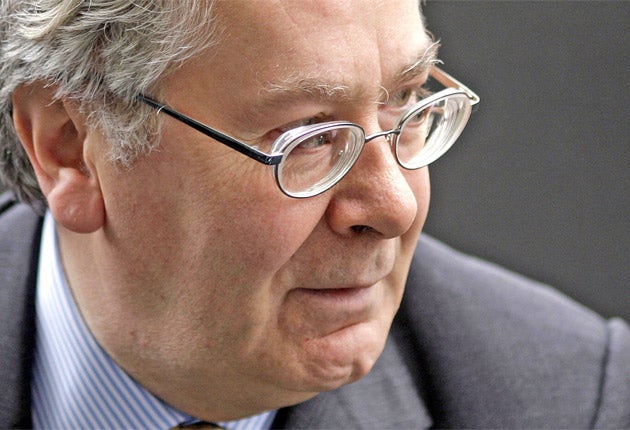Mervyn King: I see trouble ahead
Bank of England Governor's dire warning on state of the economy

A year of economic growth and faltering recovery ground to a halt as the economy shrank during the last three months of 2010, according to official data released yesterday.
The news was greeted as "shocking", "dire" and "terrible" by economists, particularly as it comes at a time when inflation is set to accelerate, threatening a return to the "stagflation" of the 1970s.
In a speech in Newcastle, the Governor of the Bank of England, Mervyn King, gave warning that inflation would rise to "uncomfortably high" levels this year – peaking at "between 4 per cent and 5 per cent" before "falling back" next year. Mr King also said that unless there was pay restraint, interest rates would quickly be raised.
The Office for National Statistics (ONS) said that most of the 0.5 per cent fall in output recorded between October and December was down to the extreme weather in the final weeks of the year – but that still implies an otherwise "flattish" economy unable to grow, and is way below expectations of continuing, albeit modest, growth.
The figures, described by the Chancellor George Osborne as "disappointing", raise fears of a "double-dip" recession which would be bad news for jobs, the public finances and the housing market. The news also sent sterling and the stock market tumbling yesterday.
Mr Osborne was, however, quick to reject any notion of a U-turn in economic policy. "These are obviously disappointing numbers, but the ONS has made it very clear that the fall in GDP was driven by the terrible weather in December," he said. "There is no question of changing a fiscal plan that has established international credibility on the back of one very cold month. That would plunge Britain back into a financial crisis. We will not be blown off course by bad weather," he added.
Ed Miliband, the Labour leader, said the growth figures were "worrying". "George Osborne is using the British Rail excuse: the wrong type of weather," said Mr Miliband. "Even without that, the economy would be flat. What worries me is that these figures relate to the period before the vast majority of the spending cuts and before the VAT rise. The Government thinks the answer is to reduce the deficit and everything will be fine. The problem is that it has made decisions that are not about growth but inhibit growth." However, he stopped short of predicting a double-dip recession.
Ed Balls, making his debut as shadow Chancellor, added: "Now we are seeing the first signs of what the Conservative-led Government's decisions are having on the economy. Cuts which go too far and too fast will damage our economy. And shrinking growth and rising unemployment is not only bad news for families, but will actually make it more difficult to get the deficit down."
The implication that inflation will not return to its 2 per cent target until well into 2012 will disturb the City. Such inflationary trends are much higher than the Bank has forecast and will lead to mounting pressure on the Bank's Monetary Policy Committee (MPC) to raise interest rates. Mr King said that the nation faced a "squeeze in living standards". In a speech that suggested no early rise in rates and mortgage bills, Mr King stressed how much of the current inflation has been caused by the increase in VAT and booming global commodity prices.
He would not, he said, be influenced by adverse headlines about inflation, but cautioned that inflationary pay rises would be met with swift action.
"Further rises in world commodity prices and energy prices cannot be ruled out, and attempts to resist their implications for real take-home pay by pushing up wages would require a response by the MPC," Mr King said.
Nonetheless, analysts said an early base-rate rise was unlikely. Chris Redfern, a senior dealer at Moneycorp, commented: "The markets certainly shivered as the UK took its first step back towards a double-dip recession. It is possible this dip will remain a one-off occurrence. However, the figure will impact on the likelihood of a rate hike, and it is unlikely that the Bank of England will raise interest rates now before the third quarter of the year."
The experts' views
"Dire" David Buik, BGC Partners
"Shockingly bad" John Hawksworth, chief economist at PwC
"Astonishingly poor" John Philpott, chief economic adviser at the Chartered Institute of Personnel and Development
"Staggeringly weak" Stuart Green, chief UK economist, HSBC
"Stunningly bad" Howard Archer, chief economist, Global Insight
"Exceptionally bad" Douglas McWilliams, Centre for Economics and Business Research
"Bolt from the blue" Andrew Goodwin, senior economic adviser to the Ernst & Young ITEM Club
"A terrible reading" Alan Clarke, UK economist, BNP Paribas
Subscribe to Independent Premium to bookmark this article
Want to bookmark your favourite articles and stories to read or reference later? Start your Independent Premium subscription today.

Join our commenting forum
Join thought-provoking conversations, follow other Independent readers and see their replies